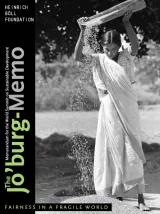The Jo'burg-Memo: fairness in a fragile world
The UN Conference on Environment and Development in Rio 1992 launched ”sustainable development” as a new name for progress. The idea caught on worldwide, but the results thus far have been mixed. After ten years, in August 2002, the World Summit on Sustainable Development in Johannesburg will be an occasion for reflection and reassessment. This Memorandum suggests an agenda for equity
and ecology for the decade to come.
From the foreword:
What will be the legacy of the Johannesburg World Summit on Sustainable Development? Will it be remembered as an ”historic” watershed, as we now regard the 1992 Rio Earth Summit? Will it serve to catalyse and renew commitments for the failed promises of Rio? Will Johannesburg generate results that will be worthy of celebration, or will it lead to yet another meaningless global photo opportunity? We publish this Memorandum a few months before the Summit, at a critical juncture of renewed political momentum. It is our contribution to the debate on both the desired outcomes of the Summit and the critical path for the sustainable development agenda in the next decade.
The composition of the Memorandum’s authorship reflects the diversity of our international network, from North and South, from East and West, from NGOs, science, politics, and business. The meetings of the Memorandum Group were convened in both the venues of the 1992 Earth Summit in Rio and the forthcoming Johannesburg Summit, as well as Berlin, the capital of an EU Member State whose government has started to take serious steps towards translating sustainability into concrete policy. The launch of the Memorandum will take place in New York, which serves as both the financial capital of the world and the seat of the United Nations.
The Memorandum raises the central but oftforgotten question ”Development yes, but what kind of development and for whom?” Its recommendations are grounded firmly in the principles of ecological sustainability and equity. The text concentrates on elaborating on the mutual and intricate relationship of ecology and equity, while not pretending that it deals exhaustively with poverty eradication in all its manifold dimensions. It combines a critical account of the post-Rio decade with a rich set of proposals how to change the paradigms of unsustainable development and to promote civic, social and environmental rights. In spite of different views on the ongoing process of globalisation the authors agree about the urgent need to re-integrate markets in a framework of social and environmental regulations and limitations on a local, regional, national and global level. The demand for a redistribution of rights and resources stands in the very centre of the memorandum.
